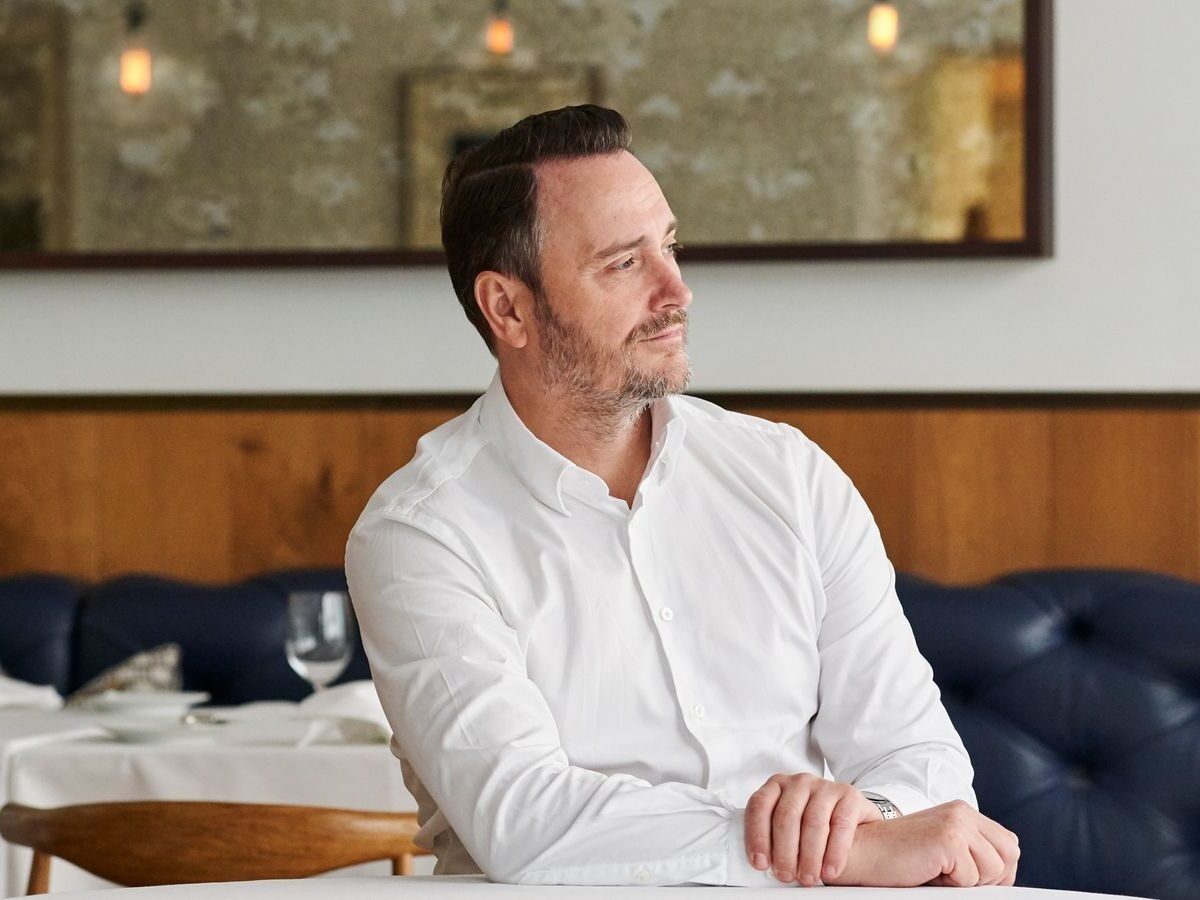The big-name chef fighting back after terrible year for some of UK’s most famous names
By Jimmy Rice, Money blog editor
Jason Atherton is not getting much sleep.
Hardly a week has gone by this year without another big-name chef closing a restaurant amid rising costs, staff shortages and a sense the public isn’t willing to blow out on high-end food the way they used to.
Marco Pierre White, Michel Roux Jr, Marcus Wareing, Monica Galetti, Simon Rimmer and Tom Brown have all announced closures, and yet it is openings that are keeping Atherton awake.
Five of them, all in London, in as many months.
“I’ve bet my whole life on this,” Atherton tells Money, already on his third coffee when we sit down at 10am with the intention, at least from the interviewer’s perspective, of answering one question: What does it take to succeed in hospitality in 2024?
“I’m no culinary messiah,” he says. “I’m not going to sit here and say come and follow me, I have the magic recipe. No one does.
“Hospitality is in a downturn, everyone knows it’s pretty tough out there, but in downturns there are also opportunities.
“If you are brave, believe in yourself, there are really good opportunities to work with landlords on failed sites, to get good rents.”
To cut costs further, Atherton has taken to renegotiating prices with his suppliers every week.
“It’s very time-consuming but that’s what it takes, every Monday we have deals done on our meat, our fish, our chemicals, our vegetables, pinning it all down.”
Gordon Ramsay paid me £250k – those days are gone
It was Gordon Ramsay who gave Atherton his first opportunity to open a restaurant, Maze, in the heart of Mayfair, in 2005.
His chef patron salary was £250,000 and the restaurant – awarded a Michelin star within a year – peaked at a turnover of £14m.
“Those days are gone,” Atherton says. “It was a different time.
“For now, gone are the days of bringing in an international designer, paying them millions of pounds to design this incredible restaurant that looks like something from the future.”
At the newly opened Sael near Piccadilly Circus, the setting for the interview, Atherton has recycled much of the decor from the previous restaurant incumbent.
“Right now my mantra is buckling down, watching costs and going back to cooking for Londoners who are more frugal with their spending power,” he says.
And so down the road at Mary’s, once home to Atherton’s one-starred Pollen Street Social, you can now get a “Cumbrian beef dirty” smash burger for £16.50, while his “elegant” Harrods Social eatery has been replaced by a concession in the store’s Dining Hall, where gourmet hot dogs are served for £19.
Not exactly cheap, but not as out of reach as some of his previous and existing ventures.
A £3.2m mistake
If Atherton is keen to not come across as someone who thinks they’re a “messiah”, it’s because he knows what failure tastes like. In 2016, he spent £3.2m building the upscale Japanese restaurant Sosharu, then another million keeping it alive for two and a half years before accepting its demise.
“I was the golden boy, I could do no wrong, and then all of a sudden I got it completely wrong,” he says, before recounting his litany of mistakes: overstaffing, not doing any market research and “putting a Mayfair restaurant in Clerkenwell”.
“Life is really tough,” he says. “The way I look at failure is: it’s just a learning curve. If I open 10 restaurants and two fail, I’ve won, but you don’t just brush the two failures under the carpet. We rip it apart, we examine them, we want to understand why they happened, and use that as a mini-university of restaurateuring.”
A joke going round
There’s a joke going around culinary circles that Atherton’s prolificacy is rivalling Brexit in the impact it is having on staffing in London, given he’s snaffled hundreds of young waiters, chefs and others all in one city, all at once.
Across the five new restaurants – which will take Atherton’s stable to 17 worldwide – he and wife Irha expect to be employing around 250 staff, and that’s not taking into account the work they’re sending the way of national restaurant reviewers, with Grace Dent and Jay Rayner among those to have already shared their experiences in print.
Despite new visa rules that are deterring a lot of the young Europeans on whom the service industry had come to depend, Atherton says the problem isn’t finding staff.
“The biggest challenge is loyalty,” he says. “Because there are a lot of opportunities out there, people know if they’re not really enjoying it, rather than sticking with it like we did in the old days, they can leave the next day and get another job the following day. I call it the social media attention span.”
He’s aware how this might sound – an elder statesman of the industry bemoaning the generations that followed – but his view of Gen Z is more rounded.
“It’s a different time, and we have to fit into them,” he says. “I get some amazing talent that comes through and we nurture that.
“These kids are very creative. I have a very young workforce and I love their creativity. I love that they push us on TikTok, on social media, very powerful tools that I don’t understand.”
‘They made me stand in a wheelie bin for the whole lunch service’
After a brief stint in the Army Catering Corps, Atherton did most of his growing up in some of the toughest kitchens in the world, even before joining the Ramsay group in 2001.
“There are many worse things, but I threw away some langoustines once and I had to go stand in a wheelie bin for the whole lunch service, with the langoustines,” he recalls. “It took me a week to get the smell of fish out of my shoes.”
Atherton inherited these at-times impossibly high standards, running tough kitchens himself as he stepped out of Ramsay’s shadow and earned Michelin stars with his own The Social Company.
Has an adjustment been required to manage a generation who’ve grown up with a different mindset, different values – or, at the age of 53, has he simply mellowed?
“A bit of both,” he says. “When you start to develop real skills, and the people around you don’t have those skills, when you’re younger you can take that as incompetence, which it’s not – you learn that as you get older.”
‘We have responsibility to new generation of chefs’
Stories abound of chefs having to work 16 or 18-hour shifts when Atherton started out.
These days, as the industry slowly embraces the concept of a work-life balance, his chefs can choose between 40-hour and 48-hour contracts.
“Our industry has a really bad reputation of overworking, overstressed, undernourished, underpaid, and it’s my generation’s job to get rid of that so the next generation isn’t burdened by it, because my generation was.”
There’s a question about how compatible this is with other goals: Michelin stars (Atherton’s Row on 45 in Dubai just claimed its second) and, ultimately in this climate, survival.
“At the same time, I don’t suffer fools,” he says. “I’m here to work, I’m here to deliver for my customers. The company has got a lot of debt around its neck and we have to repay that.”
‘There are too many fine dining restaurants’
As well as Mary’s and those gourmet hot dogs, Atherton is launching Three Darlings, a bistro in Chelsea named in honour of his daughters, and he’s just opened Sael, his “love letter to Britain”.
These will hit a price point somewhere between the £16.50 burgers and what will be his final opening in the run, the flagship Row on 5 on Savile Row, where diners can expect to pay nearer £200 a head for a “culinary journey” across 15 courses that are eaten in different parts of the building.
Atherton knows the latter is a risk as customers and the industry are “moving away from super expensive restaurants”.
Is there even a future for the kind of fine-dining establishments in which he made his name?
“The market is saturated, there’s too many,” he says. “You’ve either got to be the very, very best in the world or you don’t survive.
“For me, it’s about can I operate at that level, with a team, for the last chance in my life – that’s the dream and we’re gonna give it our best shot.”
Alongside him at Row on 5 will be the prodigious Spencer Metzger, enticed from The Ritz, whom Atherton describes as a “generational talent” on the global food scene.
Metzger, who blew away a host of the country’s best chefs to win Great British Menu in 2022, could end up as a 50% shareholder in the business if certain financial targets are met as Atherton considers life after the pass.
So could he soon be joining the likes of Wareing, another Ramsay alumnus, in stepping back completely from the industry?
“This is going to be my last fine dining restaurant,” he said.
“You heard that here first.”





